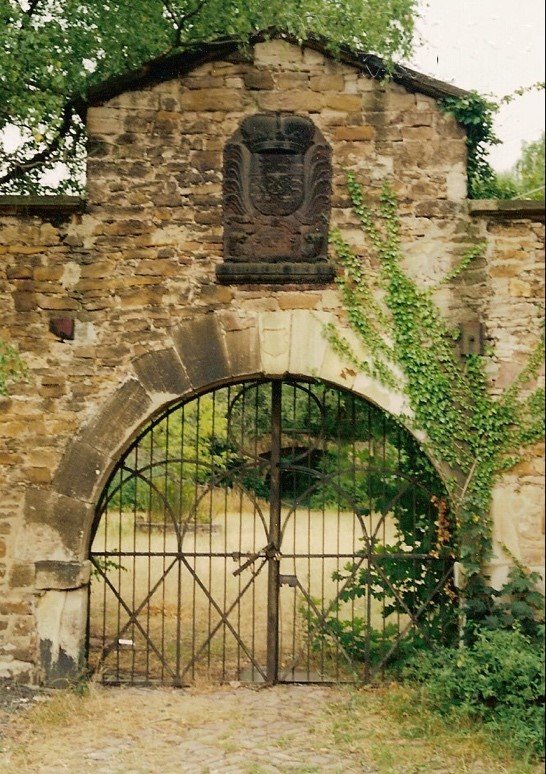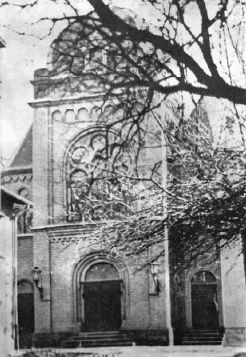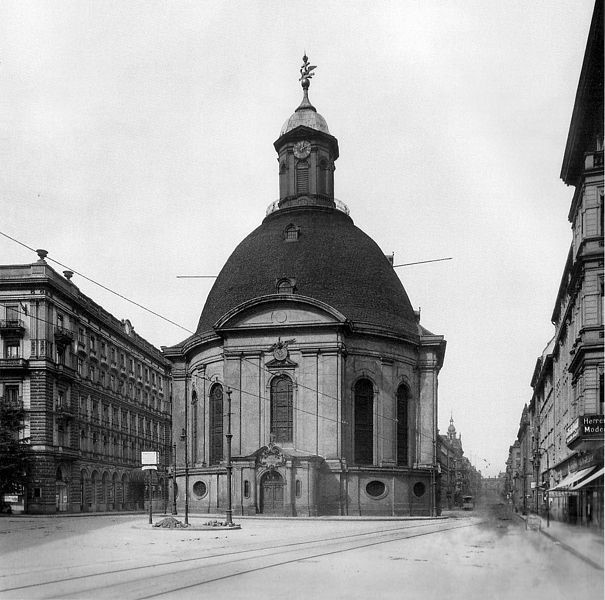by Colin Mathias Justin
On Rosh Hoshanah it is written – who will live and who will die.
Our names etched in black fire on white fire
In one of three chapters:
Exist.
Or stop existing.
Or change your mind.
The Jewish people have a special relationship with sacred names — the midrash (Vayikra Rabbah 32) says we kept our tribal identity alive and were liberated after four hundred years of slavery because we kept our Hebrew names. Folk tradition tells us that we give sick people an extra name – Chaim or Chaya – to confuse the Angel of Death, thereby changing this person’s destiny. This is more than a magic spell — we humans have long recognized that to name is to take control of fate.
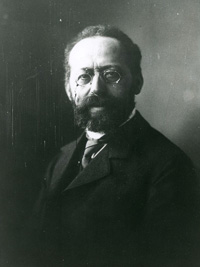
Leo, classical philologist
(August Schmidt, Photographer.)
(click image to enlarge)
Names are identities, identities are the negotiation of ego-self and world-self, sometimes a battle and sometimes an alliance. They tell us who we belong to, and who belongs to us. When HaShem (The Name) claimed Avram and Sarai, the letter hey was added to their names. In these stories, kinship building expands beyond its usual borders through divine assistance. Rather than establishing an exclusive, narrow biological lineage, Avram (Av Aram, the father of Aram) becomes Av Hamon Goyim, the father of a multitude of nations united through a shared covenant. This is why we explain “my father was a fugitive Aramean” when we tell the Passover story. Sarai, her name Sarah meaning Sharasi Sheli, “my princess and superior,” becomes a princess of nations, mother to us all (The Malbim [Gen. 17:15]).
Abram who is Abraham. In the beginning he was the father to Aram, in the end he became the father of the world. Sarai, this is Sarah. In the beginning she was Sarai to this nation and in the end she became Sarah to the whole world.
— (Talmud, Brachot 13a)
The yud dropped from Sarah’s name was later added to the name of Hosheah, who became Yehoshua (Yerushalmi, Sanhedrin 2:6). In naming Yehoshua, Moshe allows him to tap into the spiritual resources of his maternal ancestor to undertake the difficult task of entering a strange land. These names are part of power negotiations that take place during difficult phases of transition, where there is a struggle for identity and existence at play: Can I survive here, in this alien land? Even if my body survives, what about my soul? My children’s souls?
On June 28, 1808, my great-great-great-great-grandfather, Moshe Hanne Katz, went to the courthouse in the city of Istha, Westphalia, to change his family’s surname forever. Henceforth, they would no longer be Katz, but Lieberg, a suitable name for a small Jewish family dwelling in a tiny village near the formidable Hartz Mountains. The Kingdom of Westphalia had decided to grant its Jews full emancipation — on one condition: that they become Germans in name. Religious life would change, too. The new Jewish Consistory put in charge of managing the rabbis across various communities would ensure that standards were followed. There was to be no dancing, no unpleasant noise making, and no children under the age of four, please. Jews would show up to the synagogue dressed neatly and cleanly, in a dignified, solemn manner, and they would listen to sermons in German (Meyer 1967).
The Jewish Consistory and the Kingdom of Westphalia did not endure for long, but the Liebergs benefited materially from the new order. The guilds and socage (medieval system of land tenure) of the feudal economic system were done away with, providing the capitalistic reforms that would later allow Moshe’s son Wolf’s (my great-great-great-uncle) growing family to purchase the Messinghof, a metal-works where gleaming copper kettles and wash tubs were made. It accompanied a spacious, airy family house bordered by ancient ivy-laden gardens and thick hedges of beech trees (Sander 1933). The family would prosper, but as Germans first, not Jews. Only a few gravestones in Wolfhagen remain that bear the tribal identifier, HaKohen (JewishGen Online Worldwide Burial Registry — Germany, search for surname “Lieberg”, 2017). Less than a century later, half an eye-blink from the perspective of world history, the synagogue in Nordhausen where my great-grandfather, Hugo Fritz Lieberg, had leyned (read from the Torah), was burned to the ground during Kristallnacht. Fritz was sent to Buchenwald, where the synagogue’s cantor was tortured to death, and the cantor’s son committed suicide (Heidemarie Wawrzyn 2017).
On June 8, 1843, Joel Levin, another great-great-great-great-grandfather of mine, and his son, Lev Levin, found themselves in the Church of the Holy Trinity, a rotund, baroque building standing imposingly against the cobblestone streets of Berlinstadt. The poor family of Slavic Jewish merchants had moved to Berlin from Königsberg (modern-day Kaliningrad), where Lev was born in 1814. They had arrived at the cathedral seeking conversion to the Evangelical Church of Prussia (Deutschland Geburten und Taufen, 1558-1898).
The early 19th century had brought a confusing array of legal restrictions on Prussian Jews together with partial emancipation. Frederick William II’s edict of 1812 had given Jews equal civil status with Christians, but then in 1822 some of these rights were canceled for certain areas, including the right to hold professorships. Less than a hundred years earlier, there had been special taxes levied upon them, including a ridiculous demand that they purchase a certain amount of chinaware for trading. The number of Jewish marriages was also restricted. Now that emancipation had arrived, at least in name, the ruling parties could not seem to make up their minds about how tolerant they could afford to be, and continued capitulating with clarifications and exceptions. Eventually twenty-two such laws governed the behavior and aspirations of Prussia’s Jews (Deutsch 2011). People were gossiping about the near impossibility, even with the new laws, to achieve promotions to academic and government positions. Moses Mendelssohn had been denied a position at the Berlin Academy. When the mathematician Frederick Unger had applied in Berlin, he was turned away and told perhaps a conversion to the evangelical church would cause his application to be “reconsidered.” Meno Burg, an army lieutenant due for advancement to the rank of captain, had been instructed in no uncertain terms that he needed to have a change of faith in order to “clear away any obstacle to his promotion” (Clark 1995).
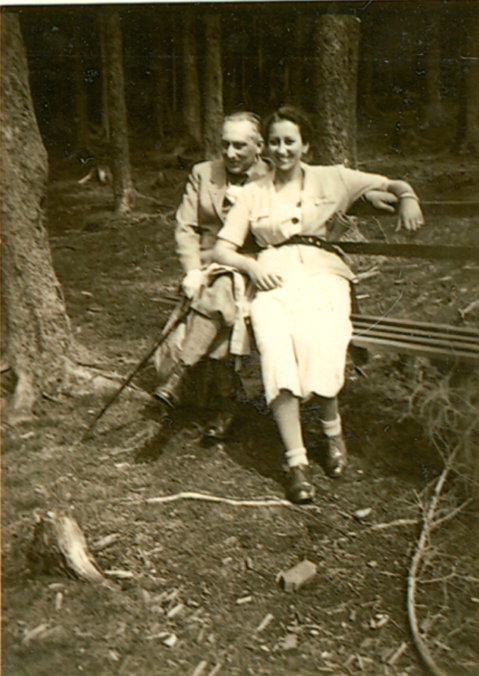
Lieberg née Gotthelft
Hiking in the Harz Mountains
(click image to enlarge)
Joel was proud of his son: Six years earlier Lev, now calling himself Ludwig, had finished his doctoral dissertation on methods of obstetrics and now he was courting a wonderful young lady of excellent family. Having completed his studies, he worked as a doctor in Regenwalde. Joel thought of the universities of Berlin and Halle with their frosty colonnades and wondered if his son could truly find a place there should he return to academia. He thought of the street riots in Warsaw and the instability of Königsberg. Joel Levin went to the baptismal font with his son that day, and left as Julius Leo. Yet the Leo boys would keep marrying nice Jewish girls, never quite truly integrated into Prussia’s German-Protestant society, perhaps attracted to the familiarity and warmth of those women who held names like Rosenheim (Rose Home), Friedlander (Peace Land), and, eventually, after danger in Germany scattered the Leos to the four corners of the earth, Lieberg, my grandmother’s family name.
These two patriarchs of the family, Levin and Katz, no less than Abram, changed the destiny of their descendants by their willing and unwilling changes of surname. Growing up with a very English-sounding surname myself, my Ashkenazi roots were hidden unless I chose to reveal them. I became curious about my family’s history once my grandmother, who bore the same English-sounding last name as myself due to her second marriage, started telling me stories about the Liebergs of Kassel, Germany. I discovered these changes of name quite by accident — Leo through a Wikipedia article and Lieberg through a family memoir.
The stories I uncovered about these men echoed what I had always heard from my parents about our family’s intense commitment to education, healing others, and creatively overcoming hardship. I recognized in the stories a common thread about hope and persistence. The more I researched the socio-historical conditions surrounding the name changes, the better I felt I understood the struggles my family has faced that make us who we are today.
May 2019
Walla Walla, Washington, USA
Research Notes and Hints
Colin provided the following information regarding his research:
- I recovered the memoir of Erna Sander by searching for the family name in DigiBaeck, a project of the Leo Baeck Institute.
- I discovered the Hebrew names of Moses Hanne Katz and his immediate kin through a surname and country search of the JewishGen Online Worldwide Burial Registry.
- The christening certificates of Lev Levin and Joel Levin were recovered through a search for their new surname, old surname, and dates of birth and death in FamilySearch’s records search.
- The biography of Friedrich Leo was found in the Deutsche Biographie.
- Historical information on 19th Century Prussia was recovered via a keyword search on JSTOR.org and Google Scholar.
Works Cited:
- Deutsch, Gotthard. 2011. Prussia. Jewish Encyclopedia
- “Deutschland Geburten und Taufen, 1558-1898”, database, FamilySearch (11 February 2018), Ludwig Levin Or Friedrich, 08 Jun 1843; citing ; FHL microfilm 70,446, 70,447, 70,448, 70,449, 70,450.
- “Deutschland Geburten und Taufen, 1558-1898”, database, FamilySearch (11 February 2018), Friedrich Or Friedrich August Levin, 18 Oct 1843; citing ; FHL microfilm 70,021, 70,022, 70,023, 70,024.
- Heidemarie Wawrzyn. 2017. Nordhausen. Destroyed German Synagogues and Communities.
- Sander, Erna (née Lieberg). 1933. Family Memoirs. Leo Baeck Institute: ME 1410. Translated from the German by Otto Schiff (2002).
- Schindel, Ulrich, “Leo, Friedrich” in: Neue Deutsche Biographie 14 (1985), S. 241-242 [Online-Version]: Leo, Friedrich
- Clark, Christopher. 1995. “The Limits of the Confessional State. Conversions to Judaism in Prussia, 1814-1843.” Past and Present. No. 147, May 1995.
- Meyer, Michael A. 1967. “The Origins of the Modern Jew: Jewish Identity and European Culture in Germany,” 1749-1824.
